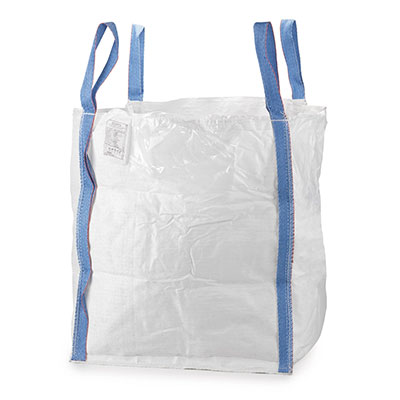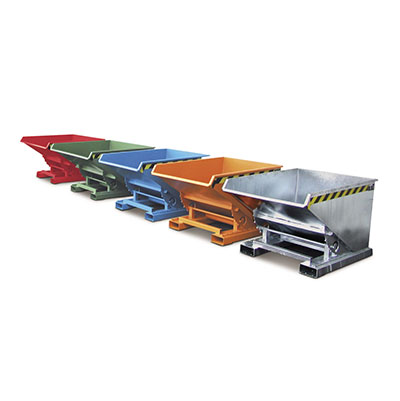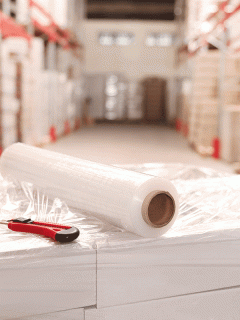In many industries, loose, free-flowing materials are an important part of the daily workflow. These materials, also known as bulk goods, require special storage and transport solutions in order to be handled efficiently and safely. In this article, we explain what exactly bulk goods are, how they differ from general cargo and which types of aids and containers have proven their worth in practice. We also take a look at the sectors in which these materials are particularly relevant and shed light on their practical application in real-life operations.
Buying storage boxes, storage crates and transport containers?The basics: general cargo, bulk goods, liquids
- Dust formation: The handling and storage of many bulk materials (e.g. cement, grain) produces fine dust. This can be harmful to health and harbours the risk of explosion.
- Compaction and clumping: Bulk goods can compact or clump together due to storage pressure or moisture, which makes handling more difficult and can jeopardise storage stability.
- Moisture and temperature sensitivity: Some bulk materials are hygroscopic and attract moisture from the environment, which can lead to lump formation, weight changes or even decomposition.
- Consistency and flow properties: Different bulk solids have different flow properties. The behaviour in the silo or storage facility can be unpredictable and lead to material jams or blockages.
- Wear and corrosion of storage containers: Bulk materials can be abrasive and wear out the storage container or conveyor systems, leading to damage and higher maintenance costs.
Hazards in the storage of bulk goods
Bulk materials such as flour, sugar or cement dust harbour an explosion hazard as they can form explosive dust clouds if they come into contact with ignition sources. There is also a risk of the storage structures collapsing, especially in silos. This risk arises when clumping causes uneven loading, which can impair stability. The health of employees is also jeopardised by toxic substances, as some bulk materials contain hazardous substances or chemicals that can cause skin or respiratory diseases. Furthermore, spilled bulk goods pose a risk of slipping and falling, especially in warehouses where such spillages occur more frequently. Another risk is the risk of contamination: especially when storing food or pharmaceutical products, dust, other bulk goods or pests can cause contamination, which could affect product quality.
Legal requirements and regulations for bulk goods storage
- Hazardous Substances Ordinance (GefStoffV): This ordinance regulates the storage and handling of hazardous substances and prescribes a comprehensive risk assessment and suitable protective measures.
- Technical Rules for Hazardous Substances (TRGS): Specific requirements are defined here, such as TRGS 510 for the storage of hazardous substances in containers.
- Federal Immission Control Act (BImSchG): In order to minimise emissions such as dust or noise, this law prescribes protective measures for environmental protection.
- Technical rules for operational safety (TRBS): In particular TRBS 2152 for the prevention of explosive atmospheres and TRBS 2153 for the prevention of electrostatic charges.
- Workplace Ordinance (ArbStättV): Regulates safety requirements in the workplace and prescribes measures to minimise health risks.
- VDI guidelines: VDI 4439 deals specifically with the avoidance of dust emissions when storing bulk materials and offers practical recommendations.
Efficient solutions for handling bulk materials
Flexible and multifunctional containers have become indispensable in the handling of bulk materials, as they can be adapted to the specific requirements of different industries. Bulk materials have different properties, from coarse-grained to powdery to moisture-sensitive or toxic, which requires customised solutions. Innovative container and conveyor systems have established themselves as the key to efficient logistics.
A major advantage of modern bulk goods solutions is their versatility. Multifunctional containers and conveyor systems can safely handle a wide range of materials and make it possible to respond flexibly to different requirements. These containers not only offer various mechanisms for tipping, spilling or filling, but also the option of adapting to special safety or hygiene standards. For example, there are antistatic containers or those with special discharge spouts for precise dosing, which are particularly important in the chemical and pharmaceutical industries.
Bulk goods storage in the construction industry
su_spacer]
In the construction industry, bulk materials such as sand, gravel and cement are essential for many building processes. Construction sites require flexible storage and easy transport of large quantities of materials. This is where the use of flexible, robust large containers has become established, which not only hold large quantities but can also react to changing requirements. The simple, safe and efficient removal of materials is important in order not to delay the construction process.
Storage containers with special mechanisms are suitable for construction sites in order to dose the material in a targeted manner and deliver it to the respective place of use. This is particularly helpful for powdery materials such as cement or granular building materials such as gravel, as precision is required here.
Containers and storage options for bulk materials in the construction industry
- Big bags (large containers):

- These flexible containers are suitable for storing and transporting bulk goods such as sand, gravel or cement. They offer an easy way to store and move bulk goods in large quantities.
- Advantage: Reusable, space-saving storage and easy to fill and empty. Our big bags are available in the standard version, with inlet spout, with outlet spout or with both inlet and outlet spouts.
- Silos:
- Permanently installed or mobile silos are often used to store fine-grained bulk materials such as cement or mortar.
- Advantage: Dust-tight storage and precise dosing during unloading thanks to special discharge systems.
- Bulk material boxes / storage chutes:
- These are stationary boxes or open storage shafts made of concrete or steel, erected directly on construction sites to store larger quantities of bulk materials such as gravel or sand.
- Advantage: Direct access and easy filling with wheel loaders or excavators.
- Tipping containers:

- Robust, stackable containers with a tipping mechanism that can easily unload bulk material. These containers are often used on construction sites to flexibly store and move small quantities of materials.
- Advantage: Safe emptying thanks to the tipping mechanism and space-saving stackability. Thanks to the tipping function, our tipping containers can be conveniently operated from the forklift seat using a cable pull.
Storing bulk goods in agriculture
Bulk goods are omnipresent in agriculture: grain, animal feed and seeds often have to be transported over long distances and stored safely. The demands placed on the containers are very high, as agricultural businesses are often reliant on efficiency and speed. Quick access to the material, combined with safe storage, is crucial for smooth work in fields or silos.
Containers that you can fill and empty easily are particularly useful here. These should also be robust enough to withstand the often harsh conditions on farms and at the same time flexible enough to accommodate both smaller and larger quantities. Transport solutions that can be easily moved with tractors or forklifts ensure that work with bulk materials remains efficient.
- Big bags (large containers):
- These flexible, hard-wearing bags are often used to store and transport bulk goods such as grain, fertiliser or animal feed. They are ideal for flexible use on farms.
- Advantage: Easy to fill, transport and reuse. They are available in different sizes to store different quantities.
- Silos:
- In agriculture, silos are indispensable for the large-scale storage of grain, maize or other harvested goods. They protect the harvest from the effects of the weather and enable long-term storage.
- Advantage: Reliable protection against environmental influences, ventilation systems to prevent moisture and mould.
- Storage chutes and bunkers:
- Open or closed storage chutes and bunkers are also common storage solutions for bulk goods in agriculture, especially for animal feed or fertiliser. These can be placed directly on the farm or at agricultural facilities.
- Advantage: Easy filling and removal by agricultural machinery such as wheel loaders.
- Tipping containers:
- Robust tipping containers are suitable for efficiently storing and transporting bulk materials such as fertiliser, grain or compost. The tipping mechanism makes it easier to empty the material in a controlled manner.
- Advantage: Mobile and versatile, particularly useful for moving bulk goods around the farm.
Bulk material storage in the recycling and disposal sector
In the waste disposal and recycling industry, bulk materials such as scrap, scrap metal or plastic waste must be moved safely and efficiently. Safe transport solutions that enable easy filling and emptying are particularly important here. Especially for heavy bulk goods such as scrap metal, containers are required that use special mechanisms to make it easier to tip out the material without requiring a great deal of force.
Another important issue is protection against external influences. Bulk containers equipped with covers help to protect the material from rain, wind or other weather influences. They also prevent materials from being lost during transport or from spreading in an uncontrolled manner.
- Tipping containers:
- Tipping bins are widely used in recycling facilities and waste management companies. They are used to collect, store and transport loose materials such as scrap metal, wood chips or plastic waste. The tipping mechanism allows the containers to be emptied easily, which makes the work process more efficient.
- Advantage: Easy handling, quick emptying thanks to the tipping mechanism and stackable for space-saving storage.
- Skip container:
- Large skip containers are used for the collection and storage of construction and demolition waste, scrap or organic waste. They offer sufficient volume for large quantities of bulk material and can be used for both stationary and mobile applications.
- Advantage: Robust construction, suitable for heavy materials, easy to transport with vehicles.
- Collection containers:
- These containers are often used in urban areas or on construction sites to collect bulk materials such as building rubble, soil or metal scraps. They are available in various sizes and are moved using cranes or lorries.
- Advantage: Flexible in use, ideal for mobile and temporary collection points.
- Press containers:
- Press containers are suitable for voluminous and light bulk materials such as paper, cardboard or plastic waste. They compress the material before disposal to save space and increase transport efficiency.
- Advantage: Reduction in volume and lower transport costs.
- Big bags:
- These flexible containers are also used in the recycling sector, particularly for the collection and storage of light bulk materials such as plastic waste, wood chips or granulates. They are particularly useful for smaller quantities or special types of waste.
- Advantage: Easy to handle and transport, space-saving and reusable.
Storing bulk goods in the chemical industry
In the chemical industry, sensitive or hazardous bulk materials such as powders or granulates are often processed. Safety and precision are paramount here. Bulk containers must therefore be designed in such a way that they can pick up the material in a controlled and clean manner and empty it in doses. Take care not to spill any material and thus prevent the creation of dust that could jeopardise occupational safety. Bulk material handling in this industry requires the utmost precision in order to fulfil quality requirements and comply with strict safety standards, especially when processing hazardous or sensitive materials.
Containers equipped with special spouts for filling and emptying offer an excellent solution here. They allow precise control of the material flow and minimise the risk of accidents or material loss.
These are for example
- Silos:
- Silos are a frequently used solution in the chemical industry for storing large quantities of bulk materials such as powders or granulates. These containers offer the possibility of storing raw materials safely and dust-free.
- Advantage: Closed systems prevent contamination and moisture, while special ventilation systems keep the storage conditions optimal.
- Big Bags (FIBC – Flexible Intermediate Bulk Container):
- Big bags are a flexible solution for storing and transporting bulk goods in the chemical industry. They are particularly suitable for materials such as plastics, chemical powders or granulates. Special designs with filling and discharge spouts enable precise dosing.
- Advantage: Reusable, dust-tight and easy to handle. With special coatings or antistatic properties, they fulfil safety requirements.
- Drum and container solutions:
- Small to medium quantities of bulk goods are often stored in special drums or containers that provide a safe and enclosed environment for sensitive or hazardous materials.
- Advantage: Protection from the weather and leaks, suitable for the storage and transport of hazardous materials.
- IBC (Intermediate Bulk Container):
- These rigid containers are ideal for the transport and storage of liquid and free-flowing bulk goods. They offer a robust and safe storage solution for powdered chemicals or granulates.
- Advantage: Easily stackable and safe for transport, often combined with pallets for efficient handling.
- Vibrating and dry containers:
- Vibratory or dry containers are used for sensitive or hygroscopic (water-attracting) bulk materials such as certain chemicals that easily clump together. These ensure that the bulk material remains free-flowing through vibration or drying.
- Advantage: Ensuring material quality through constant movement and drying to prevent clumping or moisture.
Various mechanisms to increase efficiency
Tilting and emptying mechanisms:
-
- Containers with tipping mechanisms allow bulk materials to be emptied quickly and easily. Especially in industries that work with coarse-grained materials such as construction waste or scrap metal, this solution helps to speed up the material flow while reducing the physical strain on labour. In combination with automated tipping devices, you can integrate such containers into production processes, resulting in even greater efficiency. Our tipping containers with roll-off mechanism, for example, can be emptied easily and quickly from the forklift seat.
Dosing systems and discharge spouts:
-
- For finer materials such as powders or granulates that require precise dosing, containers with discharge spouts and dosing mechanisms are advantageous. These systems enable controlled and exact emptying of the bulk material, which is particularly important in the chemical and pharmaceutical industries in order to maintain high quality standards and minimise material losses. Our big bags are available on request with a filler neck, discharge spout or both!
Special conveyor technologies:
-
- Innovative solutions such as pneumatic conveying systems or screw conveyors have proven to be extremely efficient for transporting bulk materials over longer distances within production plants. These closed systems minimise the risk of contamination and increase safety when handling potentially hazardous materials, as is often the case in the chemical industry.
Space-saving and optimised storage of bulk goods
In addition to increasing efficiency in transport and handling, space-saving storage plays a decisive role, especially when it comes to handling large quantities of bulk goods. Here, stackable containers and modular storage systems help to optimise the use of available space. In practice, this means that by using stackable tipping bins or containers, large quantities of bulk goods can be stored safely and organised without the need for additional storage space. This is a decisive advantage in industries such as agriculture or recycling, where large quantities of materials often accumulate seasonally and need to be stored efficiently and in a space-saving manner.
Another aspect is the flexibility of these container solutions: They can be easily moved, stacked or integrated into automated systems, resulting in smooth logistics processes. This versatility makes them particularly attractive in dynamic production environments where quick reactions to changing requirements are necessary.
Safety aspects and protection mechanisms
Modern bulk containers offer a variety of safety features that make handling hazardous or sensitive materials considerably easier. For example, special covers and spouts prevent the bulk material from spilling or coming into contact with the environment during transport or storage. This is particularly important in the chemical industry or when transporting dusty materials in order to minimise risks such as dust explosions or contamination of the working environment.
In addition, dust-tight constructions or antistatic containers ensure that no dangerous accumulations of dust form when handling bulk materials. These containers are often made of specially coated material, which also offers safety in potentially explosive areas. Such safety precautions are essential, especially when processing fine-grained materials such as flour, cement or chemicals.
Advantages of specialised bulk solids solutions
- Increased efficiency:
- Mechanisms such as tilting devices and dosing systems ensure accelerated material unloading, which optimises work processes and shortens throughput times. This not only leads to improved productivity, but also to a significant reduction in costs through time savings.
- Safety:
- Special safety features such as covers, anti-static materials and dust-tight systems protect the bulk material and the working environment. This is particularly important in areas where hazardous or fine-grained materials such as chemicals or explosive substances are handled. Closed systems also minimise the risk of contamination and material loss.
- Space saving:
- Containers that can be stacked enable efficient utilisation of storage space, which is particularly advantageous for large quantities of bulk goods. In industries such as construction or agriculture, where large quantities of bulk goods are produced on a seasonal or project-related basis, this helps to reduce storage costs and improve space utilisation.
- Flexibility:
- Multifunctional bulk solids solutions adapt to the different requirements of various industries. Whether for precise dosing in the chemical industry, fast transport on construction sites or long-term storage in silos: modern container and conveyor systems offer flexible application options that fulfil specific requirements.


















